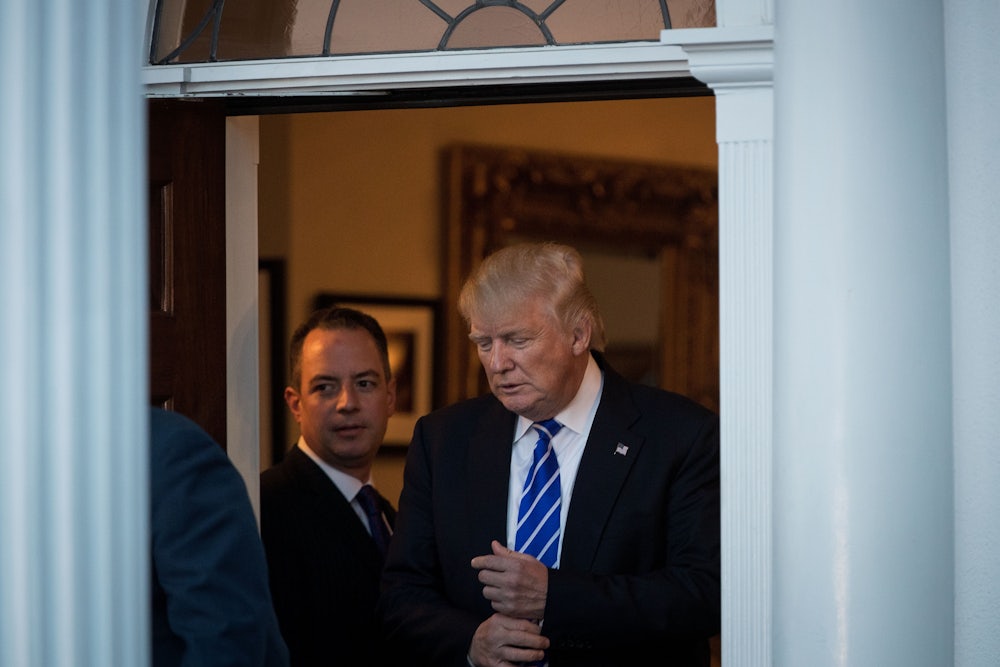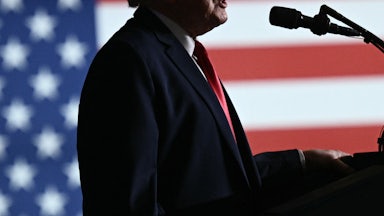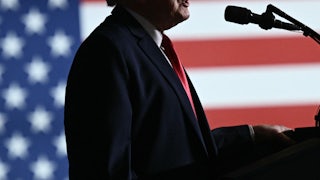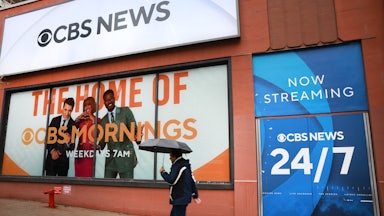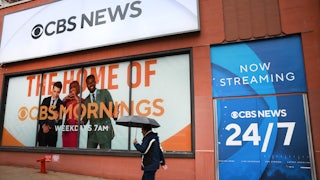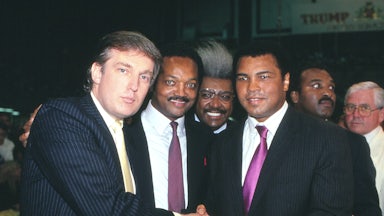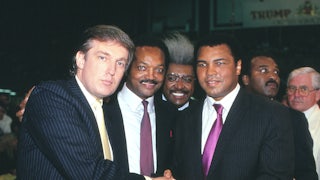For four days in mid-September, the most visited page on Wikipedia was the one that covered Laura Loomer. This sudden spike in interest coincided with a rash of press coverage around Loomer and her newfound proximity to Trump. The New York Times headlined their piece “Laura Loomer, a Social Media Instigator, Is Back at Trump’s Side,” while Semafor went with “Republicans Fear Laura Loomer Is Influencing Donald Trump.”
The notable aspect of these stories (and in all the Loomer stories) is how the authors of these various pieces chose to introduce readers to this suddenly trending Trumpworld character. Semafor seemingly assumed their politically savvy readership was familiar with Loomer; her name alone suffices. The Times, by contrast, gave her a snappy three-word bio: “social media instigator”—a cringingly vague tag, for sure, but one that invites further research.
By the way, that further research is worth the click. Laura Loomer’s Wikipedia page is a treasure trove of bumblings and fumblings, presenting her as a sort of racist slapstick comic. With such an entertaining payoff for the curious, it’s understandable that Americans got sucked in, googling Loomer, going down the rabbit hole on a figure with whom—thanks to the reality show that is Trump-era politics—we all have to be familiar. But it was also an exhausting reminder of what Donald Trump did to the press and to our own powers of attention. For four years, we were saturated with endless palace intrigue, backbiting, and scandal. While the upcoming election is about gaping policy differences, it’s also got us at a crossroads: A return to Trump represents returning to that amphetamine high; to stick with Harris means a big comedown into a life less frenetic.
The substance of political journalism underwent a noticeable shift in the Trump years. It was a whiplash of a change from the Obama White House, where personnel rarely made news (yes, a few Obama staffers were famous in D.C., but they weren’t household names), to a Trump White House where the day-to-day coverage of personnel was overwhelming. Stephanie Grisham, the longtime Trump White House staffer, says much of that coverage stemmed from Trump himself. “Our president had this knack for putting together reality TV shows and I think he did that with us brilliantly. And he enjoyed when we fought,” Grisham told me, adding, “He didn’t care whether the press was good or bad—as much as he grouses about it—he just liked that it’s us in the press. He enjoyed the gossip, he enjoyed the backbiting, he enjoyed the rumors.” And the rumors and gossip abounded: Every week, it seemed, Trump staffers were in the press. Every week, there was a new scandal.
In retrospect, maybe many of the pseudo-events that spun out of these West Wing psychodramas weren’t really bona fide scandals, but they were the news. It was the news, for example, when chief of staff Reince Priebus was fired via Twitter by then-President Donald Trump. Priebus’s ouster was Section A, Page 1 of The New York Times, under the headline “Reince Priebus Is Ousted Amid Stormy Days for White House.” And this beat—who’s hot (and who’s messy) in the Oval Office—became a moneymaker. White House reporters became household names. Grisham recalls: “Trump made a lot of his staff, including myself, kind of pawns in his reality show, and I think he did that to the press too. And it was all so new that I don’t think anybody recognized what was happening.”
Trump’s reality show sold. Digital subscriptions to the Times tripled in the Trump years. They skyrocketed at The Washington Post. We were exhausted and yet we wanted more. Trump books sold, the juicer the better. Michael Wolff’s gossipy tell-all, Fire and Fury, sold 1.4 million copies in a week. It was the best selling book in the whole world, in any genre. The book was even a hot property in Hollywood for a time; it perished in development hell for the same reason it briefly burned so brightly—with the Trump White House, there was always a hotter scandal just around the corner.
What’s the point in watching a television show about White House chaos when said chaos is playing out real-time? Why not just doomscroll Twitter during the weekly Friday news dump? If you wanted to sink yourself into a shit show of news cycles with all the orderliness of a Jersey Shore marathon—and we all occasionally do—in the Trump years, you could get the real thing daily on CNN, or just mainline the good stuff straight from the president’s Twitter feed.
Trump hardly went quietly, but when he finally did, we collectively logged off. The Washington Post hemorrhaged subscribers. In May of this year, Post publisher Will Lewis said the site has suffered a 50 percent drop in audience since 2020. The Times shifted their focus. Their story on the departure of Biden chief of staff Ron Klain in the summer of 2023—which, unlike Priebus’s Twitter-firing, was actually first reported by the Times—didn’t appear until page 17. In January of 2022, The New York Times bought The Athletic—a sports website with 1.2 million subscribers. A few weeks later, they bought Wordle from a software developer in Brooklyn.
These were expensive moves—The Athletic sold for $550 million—but the Times had to evolve in a post-Trump media ecosystem (the paper, it’s worth noting, stayed profitable while The Washington Post plummeted into the red). The Biden White House simply doesn’t sustain the same sort of round-the-clock readership of its predecessor. Alex Thompson of Axios, the present savant of the White House gossip beat, had his Biden book canceled by Simon & Schuster earlier this year because people just aren’t buying Biden books like they bought Trump books. Right-wing media crowed over this development—Fox News’s grinning headline declared: “Books about Biden presidency go ‘bust’ as Trump ‘best-sellers’ prove more popular with readers.”
But maybe it’s a good thing that Americans don’t want to read about backstabbing personnel in 1600 Pennsylvania Avenue. Maybe politics is supposed to look boring. Maybe a normal White House aspires to not produce so many juicy tell-all tomes. Grisham, who is famously the first White House press secretary never to hold a press conference, told me, “As a staffer, you should never be in the news—it should always be about your principal or the policy.” We can count on one hand the number of Biden White House staff who broke their own news cycles—T.J. Ducklo’s feud with a Politico journalist, Jenn Psaki’s too-smooth transition from politics to press. Most Americans probably can’t name the current White House chief of staff. Many others probably prefer it this way.
We have an annoying tendency to overestimate Trump, to convince ourselves that he’s some sort of master strategist. It would be another gross overestimation to suggest that Trump used the country’s obsession with personnel stories to divert attention from actual policy, but sometimes, that’s what happened. While we were hooked on White House chaos, the Trump administration was quietly making huge policy shifts that flew mostly under the radar.
In May of 2018, for example, Trump loosened restrictions on banks for the first time since the financial crisis. But on that day, we were all talking about Jared Kushner finally receiving a security clearance. A year and a half later, Betsy DeVos rolled back Obama-era rules making it harder for students to argue their college defrauded them. But all the media attention that week was on Trump aide Madeleine Westerhout’s firing after she trashed first daughters Ivanka and Tiffany over off-the-record drinks with reporters. Even Melania’s “I Really Don’t Care, Do You,” jacket drew the press’s focus away from the actual policy consequences of the underlying story of the first lady’s trip that drew all the attention—immigrant children being separated from their families.
There was occasional pushback to this nonstop barrage of personnel pieces. Michelle Wolf famously infuriated Washington when she criticized the beat in her 2018 White House Correspondents’ Dinner speech. A sane person can only get so many breaking news push alerts before they want to flush their phone down the toilet. The White House dismissed these stories as “palace intrigue” even while Trump was gleefully consuming them.
“He loves that, he loves it,” Grisham says. “I believe that’s why he brought, in part, Corey [Lewandowski] back into the mix. I believe he made us all characters, and a lot of us fell for it. And some of us are still falling for it. And I believe that that’s again why, in his mind, Corey would bring back the Loomers of the world and some of the characters, because Trump firmly believes that if you’re in the press, nobody else is. Doesn’t matter if it’s good or bad, necessarily.”
With Laura Loomer by his side, Donald Trump found another way to crash back into the news. We weren’t talking about Kamala Harris or Joe Biden. We weren’t even talking about Taylor Swift (at least, not any more than we’re always talking about Taylor Swift). Instead, we were talking about Laura Loomer’s unabashed racism and her feud with Marjorie Taylor Greene—and maybe what their seemingly close relationship meant for Melania—but more importantly, we were talking about these figures as they relate to Donald Trump.
The argument for doing palace intrigue stories has not changed, and it’s not any weaker than it was before. In 2017, one White House reporter defended the beat by explaining that “whoever has the president’s ear has influence over policy because he doesn’t have formed views on a variety of topics.” And the former president’s incapacity for independent thought remains evident. Trump’s current campaign managers, Chris LaCivita and Susie Wiles, did not advise him to visibly decompensate on live television during the debate and start ranting easily disprovable nonsense about immigrants eating dogs. That was all Laura Loomer’s doing.
Now that we’re a few weeks removed from that news cycle, does it feel any more consequential that we all had to learn about Laura Loomer? You are not any better informed about Trump’s policies, or the state of the race writ large, if you spent 10 minutes scrolling through Loomer’s Wikipedia page. But this little dish of sizzle was in the news; all anyone could talk about. And where Trump’s political era is concerned, that’s all that matters, that’s all that’s ever mattered. This is a man who used to call up tabloid reporters and, using a fake name, would pose as a “Trump spokesperson” in an effort to elbow himself into the tabloids. While president, he consumed television for hours each day just to see what they were saying about him.
In her tell-all, I’ll Take Your Questions Now: What I Saw at the Trump White House, Grisham debunks the rumor that there was a tanning bed in the White House. Instead, she says, Trump applied his own makeup each morning, as though he were appearing in his own TV show. Asked if Trump will try to remake the reality TV show vibe of his first administration, Grisham told me, “I think he’ll bring in characters, sure. Because that’s who he likes to be surrounded with, i.e., Laura Loomer, but I think he’ll want the stories now to be like ‘Twelve Administration Officials Marched Into the DOJ and Fired Two Hundred People on Monday’—I think those are going to be the stories he’s looking for now, almost a fearmongering tactic of like ‘who’s going to be next’ … I think those are going to be the kind of stories he craves.”
And if you thought the palace intrigue beat was exhausting, odds are the palace intrigue and personal vendettas beat will be even worse.
